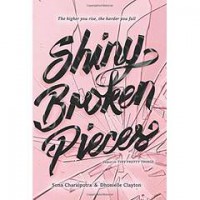

See my review for Tiny Pretty Things here.
It wasn’t great.
It wasn’t terrible.
It was kind of ‘meh.’
What I did enjoy was the depictions of actual dancing, of the ballet classes themselves, of the class getting ready to perform Swan Lake. I’ve read another ballet book where the dancing is described in terms of the physical actions taken, not a lyrical description, and I think the authors pulled off the feelings of what it is like to dance from the point of view of three characters whose lives revolve around ballet.
One of the reasons… ok the ONLY reason… I decided to read this book was to find out WHO had pushed Gigi into an oncoming car in the previous book. Tiny Pretty Things left this as a cliffhanger, which I despise, and I was pretty much OK with that for a long time. In Shiny Broken Pieces we find out pretty early on who it was definitely NOT… but then find out who it definitely WAS about halfway through. It seemed kinda early-ish for me, but then the rest of the novel focused on this massive Swan Lake performance.
One of Gigi’s defining characteristics is that she’s black, and in ballet, that’s really rare. However the authors couldn’t decide if everyone always stared at her or if she managed to blend in with the other ballerinas. I guess she could do both, but I found it wavered from one extreme to the other depending on what looked better to the plot without any consistency. Gigi was stared at A LOT, almost as if the students of a New York school had never seen a black girl before… I thought it was strange, but I do not study ballet nor do I live in New York City, so perhaps I’m not the best authority on that. In contrast, people did not stare at June, or Bette, the other two protagonists, however Bette is the epitome of the beautiful blonde white girl and June was half Korean and one of her primary characteristics was that she blended into the background.
I mean, whatever! I thought it was inconsistent but maybe that’s how people actually act. I don’t even know anymore. What is literary criticism anyway? *existential crisis*
Although I really liked the presentation of June’s anorexia and bulimia, I was a little confused how one teacher could indicate that June is too fat and everyone else was concerned she was too thin. Consistency was also an issue in Tiny Pretty Things, so maybe it’s just these authors.
Another thing I found grating was Gigi’s narrator. She had this really annoying delivery in a kind of monotone where she sounded really depressed, but then when she did dialogue she inflected much better. Her general narration annoyed the funk out of me. I don’t think Gigi was actually depressed, just bent on revenge, so was not pleasant to listen to. In contrast the other two narrators of Bette and June didn’t sound like they were uninspired and just reading from a script they hated in a job they hated, they actually delivered some entertainment.
I also want to say that I didn’t particularly like any of the characters in this novel, but I don’t think it’s a requirement in enjoying a book to like characters who are awful to each other as the main plot point (see Wuthering Heights, one of my favourite books BECAUSE I hate the characters).
I will mention that I’m not comfortable with how it ended. There was one of many characters seeking revenge for acts committed against them and they ended up losing everything while other characters who instigated the bullying kind of got rewarded? Like, I get that ballet is a cut-throat biz but I felt really sorry for the character, who was only twisted up because someone had bullied them and they was seeking revenge. The other thing that irked me was that the people who did the really bad things in Tiny Pretty Things (pushing Gigi in front of the car, glass in the shoes, killing the butterflies) were all LGBTQ characters. Like, the victims got screwed over and the biggest bullies got everything they wanted. So yeah, not cool. I like Mean Girl books because they get their comeuppance, and I didn’t feel satisfied with how everything ended.

 2
2




